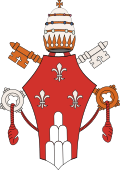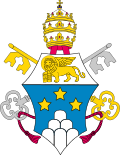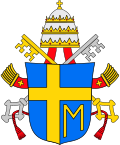Pope Benedict XVI has announced, in a surprising and shocking resignation, that he will step down on February 28, 2013, at 8:00 p.m. Has the next Pope already been predestined and foreordained?
Now: Pope Benedict XVI
The former Cardinal Joseph Ratzinger, a Hitler Youth as a boy, who later deserted the Nazis, was one of the oldest Roman Catholic Popes. He was 78 when first picked; Benedict XVI will be 85 when he ends his term. Ratzinger assumed the Papacy following John Paul II's death in 2005.
An editor of The Anomalist [Twitter @anomalistnews] has shared that Imgur is pointing out that a German calendar predicted the resignation down to the exact day. See below.
"Heiliger Strohsocki! Morgen kündige ich!" translates as "Holy smokes! Tomorrow I'll quit!" on the calendar dated Februar 10 Sonntag ("Sunday"). Note that the number "23" denotes "breaking apart" and "28" is the date in February when Benedict XVI's retirement becomes official.
Update: Sign from the Heavens?
After the resignation, what happened?
Past: Reason?
Some have noted that the conservative Pope Benedict XVI has not handled the priest sex abuse crisis extremely well.
For those who are unaware of the significant political role of Pope Benedict XVI in this scandal, you may wish to view Mea Maxima Culpa: Silence in the House of God, a powerful 2012 documentary film, directed by Alex Gibney. It is airing on HBO in 2013, including, by "coincidence," on February 11, 2013, the day Benedict XVI's resignation was announced. As the documentary notes, on November 25, 1981, Pope John Paul II named Ratzinger as the Prefect of the Sacred Congregation for the Doctrine of the Faith, formerly known as the "Sacred Congregation of the Holy Office," the historical Roman Inquisition. As the Holy Inquistor, the future Benedict XVI had all priest sexual abuse cases come through his office. As the Pope, he backed away from making fundamental changes to the structure of how the Papacy handled the scandal. As the Gibney documents, Benedict XVI may have been stopped for doing more for the victims, instead of protecting the establishment, by those surrounding him.
Next: Petrus Romanus
So what now? Did St. Malachy indicate the future of the Papacy and the Roman Catholic Church?
Now the speculation will be on who shall be chosen as the next Pope. But do the prophecies of Saint Malachy (pictured at top) give us an insight? Saint Malachy was a 12th century visionary Irish monk, who during a trek to Rome, foresaw all the popes who would reign into the future, to the final one.
When they were published, 500 years after allegedly being found in the Vatican archives, they were debunked as being false. But intriguingly, the prophecies published in Benedictine historian Arnold Wion's book Lignum Vitae in 1559, has been demonstrated to be very accurate. Indeed, Malachy's list, today, from 1139, has been found to be remarkably correct.
According to the Malachy prophecies, the next Pope could be seen as being named Petrus Romanus, Peter Romanus, Peter the Roman, or Peter of Roman. "Peter" or a variation on that name is derived from the meaning, "the Rock of the Church," linking the last Pope to the first (non-Jesus Christ) leader of the Church. (Padre, of course, is another name for "father," and is related to the name Peter.)
Peter Romanus, in the prophecies, is viewed as the last Pope. Pope Peter (II?) of Rome? Or a Cardinal named Peter?
The Future: The Church Shall Change
The phrase "the seven hilled city" is a direct reference to Rome. "The Seven Hills of Rome (Italian: Sette colli di Roma) east of the river Tiber form the geographical heart of Rome, within the walls of the ancient city. The original city was held by tradition to have been founded by Romulus on the Palatine Hill." Source.
Part of Benedict XVI's statement reads,
After having repeatedly examined my conscience before God, I have come to the certainty that my strengths, due to an advanced age, are no longer suited to an adequate exercise of the Petrine ministry...In today's world, subject to so many rapid changes and shaken by questions of deep relevance for the life of faith, in order to govern the bark of Saint Peter and proclaim the Gospel, both strength of mind and body are necessary, strength which in the last few months, has deteriorated in me to the extent that I have had to recognise my incapacity to adequately fulfil the ministry entrusted to me.Update: Cartoon Predicted Resignation
An editor of The Anomalist [Twitter @anomalistnews] has shared that Imgur is pointing out that a German calendar predicted the resignation down to the exact day. See below.
"Heiliger Strohsocki! Morgen kündige ich!" translates as "Holy smokes! Tomorrow I'll quit!" on the calendar dated Februar 10 Sonntag ("Sunday"). Note that the number "23" denotes "breaking apart" and "28" is the date in February when Benedict XVI's retirement becomes official.
Visit Imgur to view full-sized.
Update: Sign from the Heavens?
After the resignation, what happened?
Lightning struck the Vatican. Source.
Past: Reason?
Some have noted that the conservative Pope Benedict XVI has not handled the priest sex abuse crisis extremely well.
For those who are unaware of the significant political role of Pope Benedict XVI in this scandal, you may wish to view Mea Maxima Culpa: Silence in the House of God, a powerful 2012 documentary film, directed by Alex Gibney. It is airing on HBO in 2013, including, by "coincidence," on February 11, 2013, the day Benedict XVI's resignation was announced. As the documentary notes, on November 25, 1981, Pope John Paul II named Ratzinger as the Prefect of the Sacred Congregation for the Doctrine of the Faith, formerly known as the "Sacred Congregation of the Holy Office," the historical Roman Inquisition. As the Holy Inquistor, the future Benedict XVI had all priest sexual abuse cases come through his office. As the Pope, he backed away from making fundamental changes to the structure of how the Papacy handled the scandal. As the Gibney documents, Benedict XVI may have been stopped for doing more for the victims, instead of protecting the establishment, by those surrounding him.
Next: Petrus Romanus
So what now? Did St. Malachy indicate the future of the Papacy and the Roman Catholic Church?
Now the speculation will be on who shall be chosen as the next Pope. But do the prophecies of Saint Malachy (pictured at top) give us an insight? Saint Malachy was a 12th century visionary Irish monk, who during a trek to Rome, foresaw all the popes who would reign into the future, to the final one.
Malachy, in verse, wrote down the future names of the Popes in epigrammatic code, which have been clearly linked to the names of the Popes chosen. Malachy's series of visions are about 112 Popes from Celestine III, who was elected Pontiff in 1130, until the last Pope who is described in his list as Peter Romanus.
The last Pope? Yes, Malachy is said to have seen the end of the Papacy with the election of what would be the next Pope after his predicted Benedict XVI (The Glory of the Olive).
Peter the Apostle probably never visited Rome. Source.
Peter Romanus, in the prophecies, is viewed as the last Pope. Pope Peter (II?) of Rome? Or a Cardinal named Peter?
The Future: The Church Shall Change
The Saint Malachy verses end thusly:
In the persecution of the Holy Roman Church,
There will reign Peter the Roman,
Who will feed his flock among many tribulations
After which the seven hilled city will be destroyed
And the dreadful Judge will judge the people.
The phrase "the seven hilled city" is a direct reference to Rome. "The Seven Hills of Rome (Italian: Sette colli di Roma) east of the river Tiber form the geographical heart of Rome, within the walls of the ancient city. The original city was held by tradition to have been founded by Romulus on the Palatine Hill." Source.
The verse is seen as predicting everything from the end of the Papal structure to the end of the world. Will the celibacy of priests end under the next Pope?
Prepare to see many views of the Vatican's obelisk during February 2013.
Here is how Wikipedia summarizes the most recent Papal Prophecies of Saint Malachy in their longer selection on Bishop Malachy's visions:
| Religio depopulata. | |||||
| 260 | 104 Religion destroyed | Benedict XV (1914–1922) | Giacomo Della Chiesa | Reigned during, but had no influence to stop, World War I. This unprecedented period of violence was mainly fought between the Christian powers of Europe, destroying empires which had lasted centuries and began the worldwide spread of atheistic Communism. |  |
| Fides intrepida. | |||||
| 261 | 105 Intrepid faith | Pius XI(1922–1939) | Achille Ratti | Established Vatican City as a sovereign country with the papal office as head of state. |  |
| Paſtor angelicus. | |||||
| 262 | 106 Angelic shepherd | Ven. Pius XII (1939–1958) | Eugenio Pacelli | Reigned during World War II, he is reported to have covertly helped Italian Jews escape extermination. Said to have received visions, some of which have yet to be revealed. |  |
| Paſtor & nauta. | |||||
| 263 | 107 Shepherd and sailor | Bl. John XXIII(1958–1963) | Angelo Giuseppe Roncalli | From Venice, a maritime city. |  |
| Flos florum. | |||||
| 264 | 108 Flower of flowers | Paul VI(1963–1978) | Giovanni Battista Enrico Antonio Maria Montini | His coat of arms featured three fleur-de-lys. |  |
| De medietate lunæ. | |||||
| 265 | 109 From the midst of the moon | John Paul I (1978) | Albino Luciani | His month-long reign began with the moon half-full. |  |
| De labore ſolis. | |||||
| 266 | 110 From the labour of the sun | Bl. John Paul II(1978–2005) | Karol Wojtyła | Born on the day of a solar eclipse and entombed on the day of a solar eclipse. |  |
| Gloria oliuæ. | |||||
| 267 | 111 Glory of the olive. | Benedict XVI (2005–2013) | Joseph Ratzinger | Chose the regnal name Benedict after St Benedict of Nursia, founder of the Benedictine Order. The order's crest contains an olive branch. |  |
| In ꝑsecutione extrema S.R.E. ſedebit. | |||||
| In the extreme persecution of the Holy Roman Church, there will sit. | |||||
| Petrus Romanus, qui paſcet oues in multis tribulationibus: quibus tranſactis ciuitas ſepticollis diruetur, & Iudex tremẽdus iudicabit populum ſuum. Finis. | |||||
| 268 | 112 Peter the Roman, who will Nourish the sheep in many tribulations; when they are finished, the city of seven hills will be destroyed, and the dreadful judge will judge his people. The end. | Unknown | Unknown | ||






























0 comments:
Post a Comment